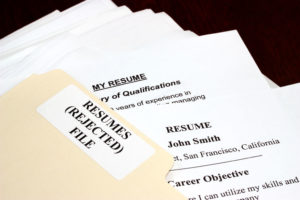 Your resume is your first impression on a potential employer. A well-written document is a strictly objective and succinct recap of your professional. Avoid turning in a sloppy resume with these top 10 tips!
Your resume is your first impression on a potential employer. A well-written document is a strictly objective and succinct recap of your professional. Avoid turning in a sloppy resume with these top 10 tips!
Be sure not to:
- Personal Details – It’s not necessary to include the following
- Photo – There is an 88% chance of job rejection if you include a photo on your resume. Some will immediately dismiss them to avoid a potential accusation of discrimination.
- Date of birth
- Gender
- Sexual Orientation
- Religion
- Political Affiliation
Employers may base their decisions on personal data. By not including this information, you prevent the possibility of discrimination.
- Spelling Errors and Poor Grammar – According to the Recruitment and Employment Commission:
- Around 50% of all resumes received by recruitment consultants contain spelling or grammatical errors.
- 21-25-year-olds are the most likely culprits
- Among this age group, graduates are twice as likely to make mistakes compared to those that did not attend college
If you find correcting spelling and grammar diffycult challanging tricky, use a spell checker and be sure to proofread. Reading your resume in print, rather than on screen, can help you identify mistakes. It is also a good idea to ask a friend or family member to check through your work.
- Irrelevant Work Experience – Your resume should show the employer as quickly as possible that you match their requirements for the role. Cut out any irrelevant information that might dilute your key message.
If information about any irrelevant work experience is needed to fill gaps in your resume, limit details to a minimum.
- Read the job description carefully and decide what information is actually relevant to the role
- Write down a list of keywords or phrases to help you focus on your resume as much as possible
The average job search lasts 18 weeks but can be longer for candidates without a strong resume!
- Hobbies and Oddities – For the most part, employers do not need, or want to know what you get up to in your spare time. “Like, I love collecting crazy pens,” or using your fun contact email address “iambatman@whatwereyouthinking.com” (79% of resumes are ignored if the email address is unprofessional). While these express your personality, they may cost you a potential interview.
Exception: If you have a hobby that relates to the role you’re applying for, like a novelty pen designer for instance, then by all means include it.
- Negativity– It’s important to use positive language on your resume. Replace negative phrases with positive ones. Resist the temptation to bad mouth previous employers.
Research has shown there are terms and phrases to avoid using, even in a positive context like this one, “I have an aggressive passion for what I do.”
Avoid these words:
- Awful
- Bad
- Fault
- Hate
- Mistake
- Nothing
- Problem
92% of recruiters would reject candidates that make negative comments on social media.
- The Cart Before the Horse – Prospective employers will not need references until much later in the recruitment process, so there is no need to include them on your resume. Instead, keep an up to date list of references separately ready to send if requested. Use “References available on request.” This, states the obvious therefore it is not necessary to include.
Remember, recruiters spend an average of 5-7 seconds looking at a resume, so use this additional space to dazzle the reader with your excellent skills and experience.
- Bend the Truth – Everyone adds a little sparkle to their resume, but avoid the temptation to go overboard – it is likely you’ll be found out if you do get the job.
According to the Society for Human Resource Management, 96% of organizations reported conducting some form of background check on every employee so, job seekers should be sure the position they are applying for is a good fit for them. If it is, there will be no need to lie as your true qualifications will speak for themselves.
- Information Overload – Show off your communication skills by slimming down your resume.
- At graduate level, a relevant one-page resume is perfect
- A two-page resume is standard for experienced professionals
- Resumes with three or more pages are likely to put off potential employers
A lengthy resume gives the impression that you’re unable to distinguish important information from the irrelevant. Concentrate on the relevant details!
- Get a Little Too Creative – Keep your resume easy to read and professional by using:
- Underlined, bold, and italic text sparingly
- Aligned headings and structured layout
- A simple classic font, such as Georgia or Helvetica
Do not:
- Handwrite your resume
- Apply distracting colors
- Use clip art
- Wooly Language and Jargon – Meaningless jargon, clichés and vague wording must be avoided when writing your resume i.e. “I am an innovative, detail-oriented problem solver who thinks outside the box.” Instead, use examples with facts and figures to show you are the perfect candidate.
- 71% of employers say the regularly see jargon or acronyms in resumes
- 54% of employers say they are regularly irritated by resume jargon
- 41% of employers agree that men use more jargon than women on their resumes
Sources: statisticbrain.com / guardian.com / undercoverrecruiter.com / propellondon.com / totaljobs.com / forbes.com / gradschool.com / business.time.com / careersavvy.co.uk